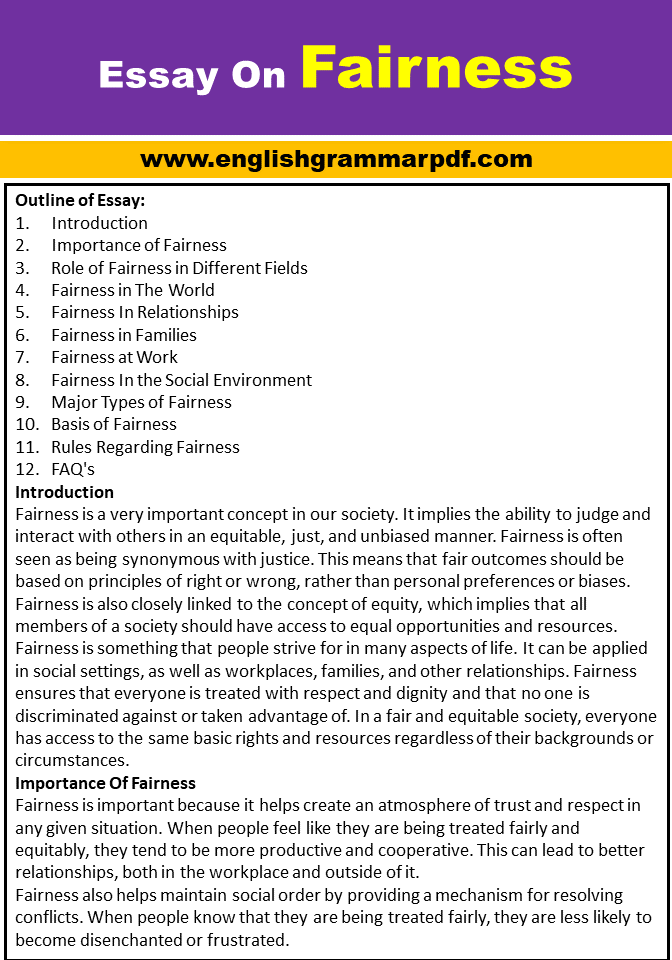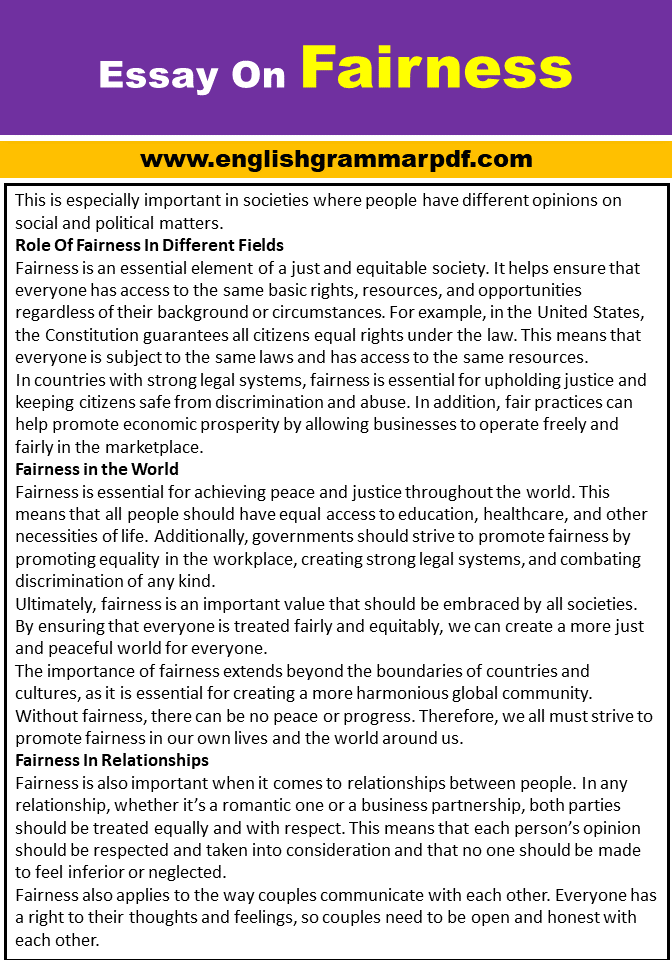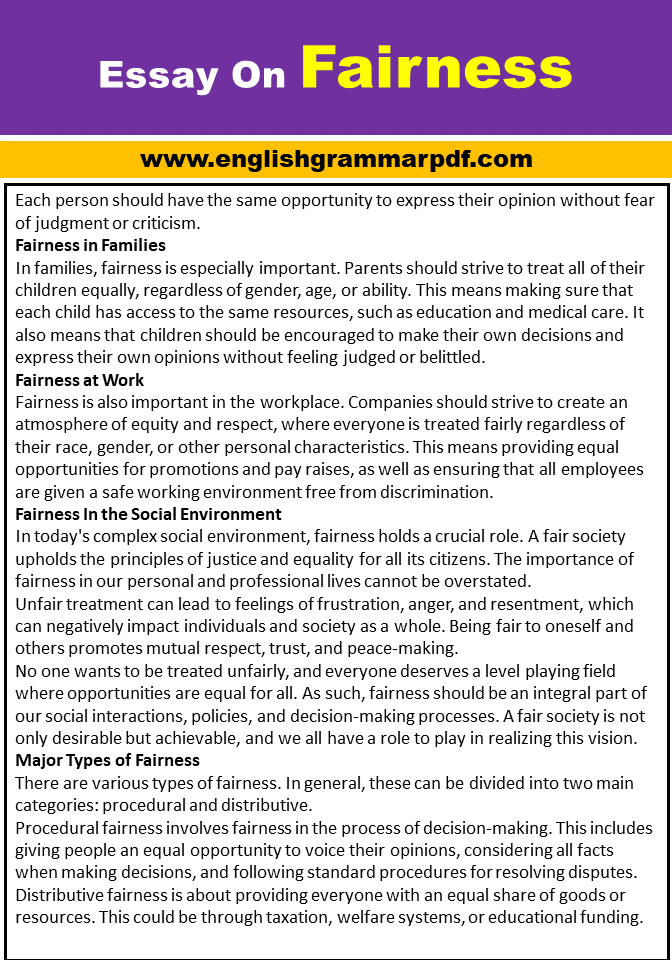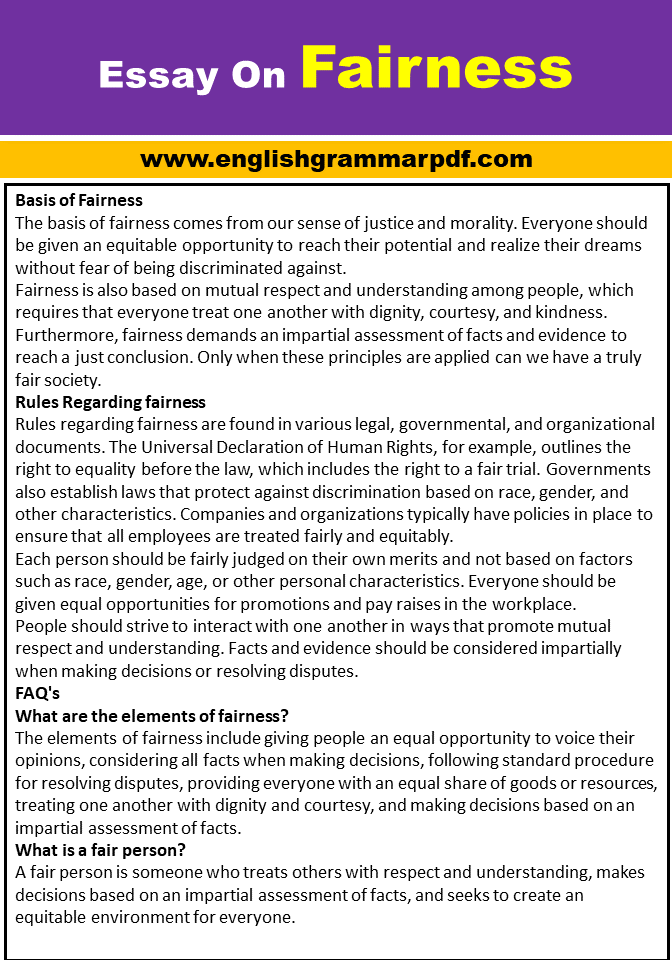Essay On Fairness
Outline of Essay:
- Introduction
- Importance of Fairness
- Role of Fairness in Different Fields
- Fairness in The World
- Fairness In Relationships
- Fairness in Families
- Fairness at Work
- Fairness In the Social Environment
- Major Types of Fairness
- Basis of Fairness
- Rules Regarding Fairness
- FAQ’s

Introduction
Fairness is a very important concept in our society. It implies the ability to judge and interact with others in an equitable, just, and unbiased manner. Fairness is often seen as being synonymous with justice. This means that fair outcomes should be based on principles of right or wrong, rather than personal preferences or biases. Fairness is also closely linked to the concept of equity, which implies that all members of a society should have access to equal opportunities and resources.
Fairness is something that people strive for in many aspects of life. It can be applied in social settings, as well as workplaces, families, and other relationships. Fairness ensures that everyone is treated with respect and dignity and that no one is discriminated against or taken advantage of. In a fair and equitable society, everyone has access to the same basic rights and resources regardless of their backgrounds or circumstances.
Importance Of Fairness
Fairness is important because it helps create an atmosphere of trust and respect in any given situation. When people feel like they are being treated fairly and equitably, they tend to be more productive and cooperative. This can lead to better relationships, both in the workplace and outside of it.
Fairness also helps maintain social order by providing a mechanism for resolving conflicts. When people know that they are being treated fairly, they are less likely to become disenchanted or frustrated. This is especially important in societies where people have different opinions on social and political matters.
Role Of Fairness In Different Fields
Fairness is an essential element of a just and equitable society. It helps ensure that everyone has access to the same basic rights, resources, and opportunities regardless of their background or circumstances. For example, in the United States, the Constitution guarantees all citizens equal rights under the law. This means that everyone is subject to the same laws and has access to the same resources.
In countries with strong legal systems, fairness is essential for upholding justice and keeping citizens safe from discrimination and abuse. In addition, fair practices can help promote economic prosperity by allowing businesses to operate freely and fairly in the marketplace.
Fairness in the World
Fairness is essential for achieving peace and justice throughout the world. This means that all people should have equal access to education, healthcare, and other necessities of life. Additionally, governments should strive to promote fairness by promoting equality in the workplace, creating strong legal systems, and combating discrimination of any kind.
Ultimately, fairness is an important value that should be embraced by all societies. By ensuring that everyone is treated fairly and equitably, we can create a more just and peaceful world for everyone.
The importance of fairness extends beyond the boundaries of countries and cultures, as it is essential for creating a more harmonious global community. Without fairness, there can be no peace or progress. Therefore, we all must strive to promote fairness in our own lives and the world around us.
Fairness In Relationships
Fairness is also important when it comes to relationships between people. In any relationship, whether it’s a romantic one or a business partnership, both parties should be treated equally and with respect. This means that each person’s opinion should be respected and taken into consideration and that no one should be made to feel inferior or neglected.
Fairness also applies to the way couples communicate with each other. Everyone has a right to their thoughts and feelings, so couples need to be open and honest with each other. Each person should have the same opportunity to express their opinion without fear of judgment or criticism.
Fairness in Families
In families, fairness is especially important. Parents should strive to treat all of their children equally, regardless of gender, age, or ability. This means making sure that each child has access to the same resources, such as education and medical care. It also means that children should be encouraged to make their own decisions and express their own opinions without feeling judged or belittled.
Fairness at Work
Fairness is also important in the workplace. Companies should strive to create an atmosphere of equity and respect, where everyone is treated fairly regardless of their race, gender, or other personal characteristics. This means providing equal opportunities for promotions and pay raises, as well as ensuring that all employees are given a safe working environment free from discrimination.
Fairness In the Social Environment
In today’s complex social environment, fairness holds a crucial role. A fair society upholds the principles of justice and equality for all its citizens. The importance of fairness in our personal and professional lives cannot be overstated.
Unfair treatment can lead to feelings of frustration, anger, and resentment, which can negatively impact individuals and society as a whole. Being fair to oneself and others promotes mutual respect, trust, and peace-making.
No one wants to be treated unfairly, and everyone deserves a level playing field where opportunities are equal for all. As such, fairness should be an integral part of our social interactions, policies, and decision-making processes. A fair society is not only desirable but achievable, and we all have a role to play in realizing this vision.
Major Types of Fairness
There are various types of fairness. In general, these can be divided into two main categories: procedural and distributive.
Procedural fairness involves fairness in the process of decision-making. This includes giving people an equal opportunity to voice their opinions, considering all facts when making decisions, and following standard procedures for resolving disputes.
Distributive fairness is about providing everyone with an equal share of goods or resources. This could be through taxation, welfare systems, or educational funding.
Basis of Fairness
The basis of fairness comes from our sense of justice and morality. Everyone should be given an equitable opportunity to reach their potential and realize their dreams without fear of being discriminated against.
Fairness is also based on mutual respect and understanding among people, which requires that everyone treat one another with dignity, courtesy, and kindness. Furthermore, fairness demands an impartial assessment of facts and evidence to reach a just conclusion. Only when these principles are applied can we have a truly fair society.
Rules Regarding fairness
Rules regarding fairness are found in various legal, governmental, and organizational documents. The Universal Declaration of Human Rights, for example, outlines the right to equality before the law, which includes the right to a fair trial. Governments also establish laws that protect against discrimination based on race, gender, and other characteristics. Companies and organizations typically have policies in place to ensure that all employees are treated fairly and equitably.
Each person should be fairly judged on their own merits and not based on factors such as race, gender, age, or other personal characteristics. Everyone should be given equal opportunities for promotions and pay raises in the workplace.
People should strive to interact with one another in ways that promote mutual respect and understanding. Facts and evidence should be considered impartially when making decisions or resolving disputes.
FAQ’s
What are the elements of fairness?
The elements of fairness include giving people an equal opportunity to voice their opinions, considering all facts when making decisions, following standard procedure for resolving disputes, providing everyone with an equal share of goods or resources, treating one another with dignity and courtesy, and making decisions based on an impartial assessment of facts.
What is a fair person?
A fair person is someone who treats others with respect and understanding, makes decisions based on an impartial assessment of facts, and seeks to create an equitable environment for everyone.
What is the importance of fairness in education?
Fairness in education is essential to ensure that everyone has an equal opportunity to succeed. This includes providing equitable access to resources and learning opportunities, evaluating students based on the same criteria, and giving all students a fair chance to demonstrate their knowledge and skills. Additionally, fairness in education helps to create a safe and inclusive environment for all learners.
What are some examples of fairness at home?
Examples of fairness at home include treating siblings equally, giving everyone a chance to share their opinions, and making decisions that take into account the needs of all family members. Additionally, it is important to respect each other’s privacy and be mindful of how one’s actions may impact others in the household. Finally, providing equal access to resources and opportunities for learning will help ensure that everyone has a chance to reach their potential.
Download the PDF of Essay On Fairness






